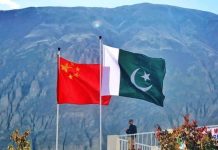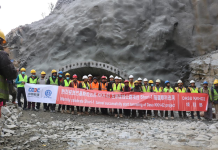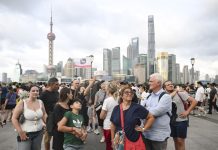BEIJING: With the first batch of Sinovac COVID-19 Vaccines rolling off production lines in Egypt on July 5, it became the first country on the African continent to do so in cooperation with China. The program was launched in December 2020. Local production commenced six months later and reached an output of 1 million doses within a relatively short period.
In May 2020, at the opening ceremony of the 73rd World Health Assembly, Chinese President Xi Jinping announced that China would be making its vaccines available to the world, serving it as a global public good. “This will be China’s contribution to ensuring vaccine accessibility and affordability in developing countries,” Xi told the event via video link.
One year later, Xi announced new measures China would be taking to continue its support for global response at the Global Health Summit. The local production in Egypt represents one of the moves by China to boost the equal distribution of vaccines, all the while bridging the immunity gap.
China will strive to provide 2 billion COVID-19 vaccine doses to the world this year and offer $100 million to the COVID-19 Vaccine Global Access (COVAX) led by the World Health Organization (WHO). And the $100 million will mainly go to the distribution of vaccines to developing countries, Xi said in a written message to the first meeting of the International Forum on COVID-19 Vaccine Cooperation on August 5.
Participants in the meeting issued a joint statement, underlining the importance of vaccine multilateralism and calling on countries to enhance international cooperation mechanisms and collaboration.
As of August 4, 4.28 billion vaccine doses had been administered worldwide with 29.1 percent of the global population receiving at least one dose, according to Our World in Data, an online project of UK-based Global Change Data Lab.
However, now that the introduction of vaccines has begun and their effectiveness in curbing the pandemic is apparent, how to solve the uneven distribution on a global scale has become a topic of grave importance, Li Baodong, Secretary General of the Boao Forum for Asia (BFA), said at a press conference where the BFA released a report on the global use of COVID-19 vaccines on July 29.
Li’s worry was echoed by Zha Daojiong, a professor at the School of International Studies of Peking University, saying that though the production capacity for COVID-19 vaccines can be ensured worldwide, equal accessibility remains a prominent challenge, especially for developing countries. For example, according to a report by WHO in April, the total of vaccines already administered in Africa accounted for less than 2 percent of inoculations across the world. Statistics from Our World in Data also show that an average of only 1.1 percent of the populations of low-income countries have received at least one dose of a vaccine. “The commitments expressed by some countries and international organizations to provide vaccine assistance to developing countries, however, have yet to fully translate into reality,” Li said, adding that some have played up their contributions to the fight against the pandemic, with little actually having been achieved.
– The Daily Mail-Beijing Review News exchange item






